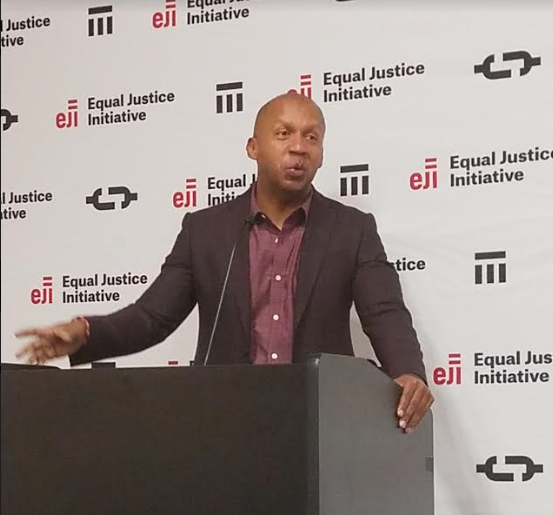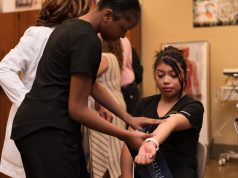
By William C. Singleton III
For The Birmingham Times
Bryan Stevenson, founder and executive director of the Equal Justice Initiative in Montgomery, said Monday he is not concerned that some will find a museum and memorial on slavery and lynching too gruesome.
Stevenson met with local and national media as EJI prepared to open on April 26 a memorial and museum as part of its work to advance truth and reconciliation around race in America and to confront the legacy of slavery, lynching, and segregation.
A previous EJI project that put street markers in Montgomery to highlight the movement of the slave trade was well received, Stevenson said. “We’ve had students come through; we’ve had groups come through and … we have a lot of people who come from far away. So I’m hoping people near and far come. We’ll see.”
“We’re really hopeful that a lot of people in this community are going to be a part of this,” said Stevenson.
The EJI, a nonprofit group that represents poor defendants and prisoners denied fair treatment in the legal system, is ready to unveil the nation’s first memorial dedicated to black victims of lynching. The project involves two components: a museum which traces the journey of blacks from slavery to incarceration in American prison systems and a separate memorial facility with 805 rusted steel monuments with the names, counties and states where victims were lynched.
On Monday, the tour started at the EJI’s offices on 122 Commerce Street in a room containing a wall with 336 jars situation in 11 rows. The jars contained soil from the site of lynchings throughout the United States. The names of the victims adorn the jar and the date of the lynching. Those unidentified are marked “Unknown.” The same display is included in The Legacy Museum that stands a block away from EJI’s office on 115 Coosa Street.
The 11,000-square-foot Legacy Museum, built on the site of a former warehouse that imprisoned enslaved black people, is located midway between a historic slave market and the main river dock and train station where tens of thousands of enslaved people were trafficked during the height of the domestic slave trade.
The National Memorial for Peace and Justice is the nation’s first memorial dedicated to the legacy of enslaved black people, people terrorized by lynching, African-Americans humiliated by racial segregation and Jim Crow, and people of color burdened with contemporary presumptions of guilt and police violence. Work on the memorial began in 2010, when EJI staff began investigating thousands of lynchings in the South, many of which had never been documented.




